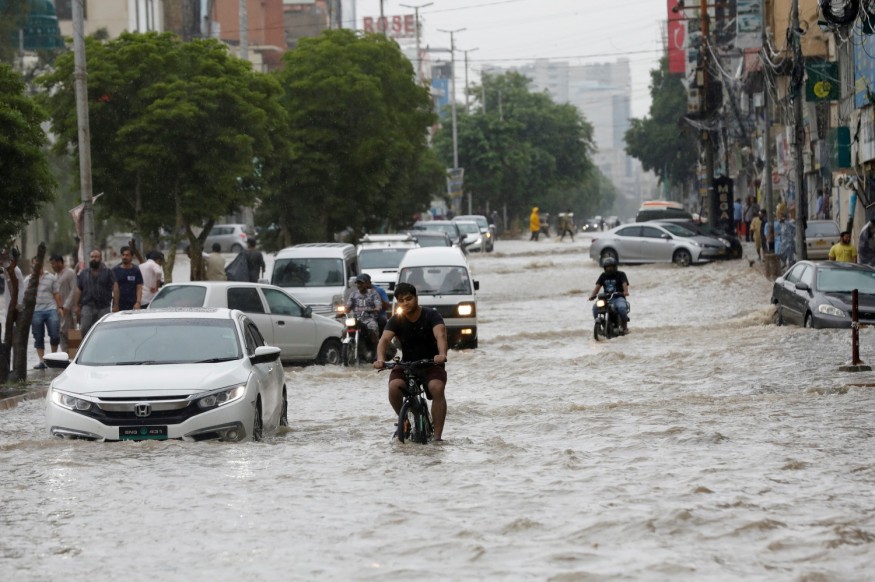Three days of incessant monsoon rains have claimed the lives of 90 people, damaged homes in Pakistan, flooded streets, and destroyed properties. In Karachi, sewage waters from an outdated sewage system flooded the city's streets and houses. July to September is the country's monsoon season.

READ: Explaining Today's Hyperactive Hurricane Season, Tropical Storm Trends, and Their Implication
Rising Rain-Related Casualties Across the Country
According to the country's national disaster management agency, the three-day rain has killed 31 people in southern Sindh province, 23 in Khyber Pakhtunkhwa, 15 in Baluchistan province, and eight in Punjab province. Meanwhile, on the northern side of Pakistan, eight people died.
Three hundred (300) people were evacuated by troops using boats from the rain-hit district of Dadu in Sindh province, while Karachi has 1,245 evacuees. Numerous vehicles in Karachi were also submerged in water.
Troop, rescuers, and volunteers from Tehreek-e-Labbaik, the radical Islamist group, are helping residents evacuate from flooded residential areas as families waded through flooded streets to move to a safer location. Hundreds of residents also sought refuge in houses of relatives.
Prime Minister Imran Khan ordered troops to help local officials in cleaning up flooded residential areas last month.
READ ALSO: Methane Leak: The Decade-Long Poisoning of the North Sea by a Major Gas Company
Record-Breaking Heavy Rainfall
According to the Meteorology Department, Karachi recorded 345 mm of precipitation in August, the highest rainfall since August of 1984.
The department said that the rains would likely continue for the next two days as another system is developing in the Bay of Bengal and may enter the province end week of August or early September and bring heavy rainfall.
In the wake of heavy rain and flooding in low-lying areas of Sidh, Chief Minister Syed Murad Ali Shah declared a rain emergency in the province. "We stand with the people in this time of difficulty," he said.
According to Pakistan's weather advisory, heavy rains are expected in "Karachi, Hyderabad, Thatta, Badin, Shaheed Benazirabad, Dadu, Tharparker, Nagarparker, Mirpurkhas, Islam Kot, Umar Kot, Sanghar, Sukkur, and Larkana from Monday to Wednesday." Thus, the public is advised that the heavy downpour is expected to flood Karachi, Hyderabad, Thatta, and Badin from Monday to Tuesday, and may also generate flash floods in Kalat, Khuzdar, and Lasbela.
Electricity Power Out
In some regions of Karachi, the electricity supply is temporarily off for safety reasons, a spokesman for K-Electric said. According to K-Electric, water has seeped through electric installations in Gulshan, Gulistan-i-Jauhar, and Bin Qasim. As houses in the low-lying city are also flooded, restoring the electricity poses risks.
Monsoon Season Amid the Coronavirus
As monsoon rains are drenching Pakistan, authorities are racing against time to contain the spread of COVID-19. Deaths in Pakistan are reported to have reached 6,200 deaths since its first case in February. The country declared its first lowest number of fatalities since March on Tuesday: nine.
Monsoon season has always been an annual struggle for Pakistan because of massive flooding, drawing criticism about poor planning.
READ NEXT: Increased Incidences of Stranded Whales Linked to Military Sonar Exercises, Experts Say
Check out more news and information on Global Warming on Nature World News.
© 2025 NatureWorldNews.com All rights reserved. Do not reproduce without permission.





